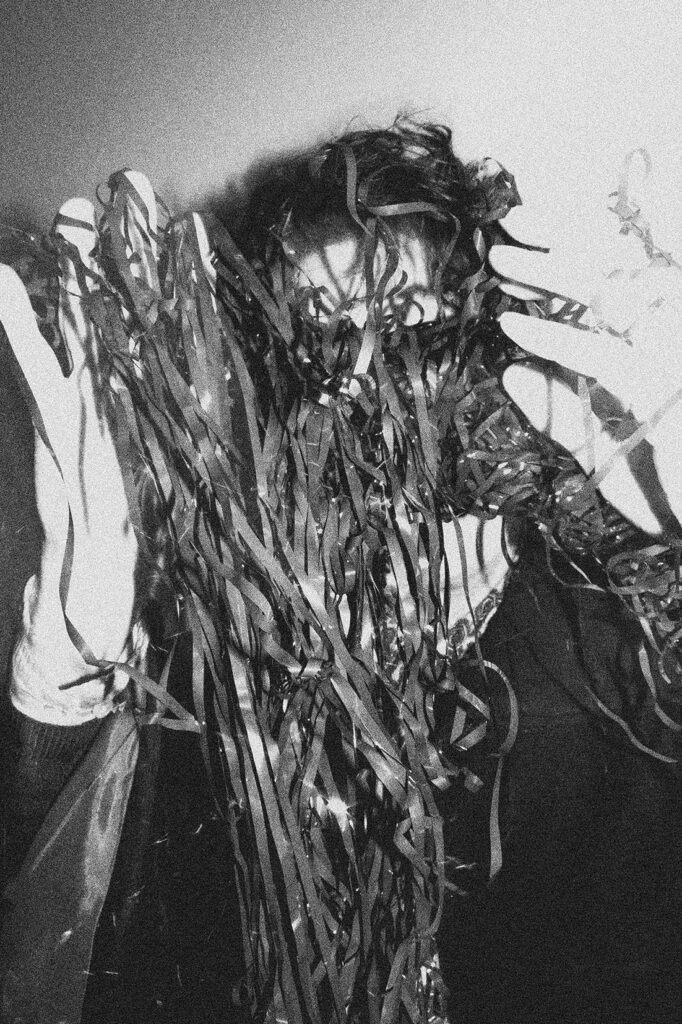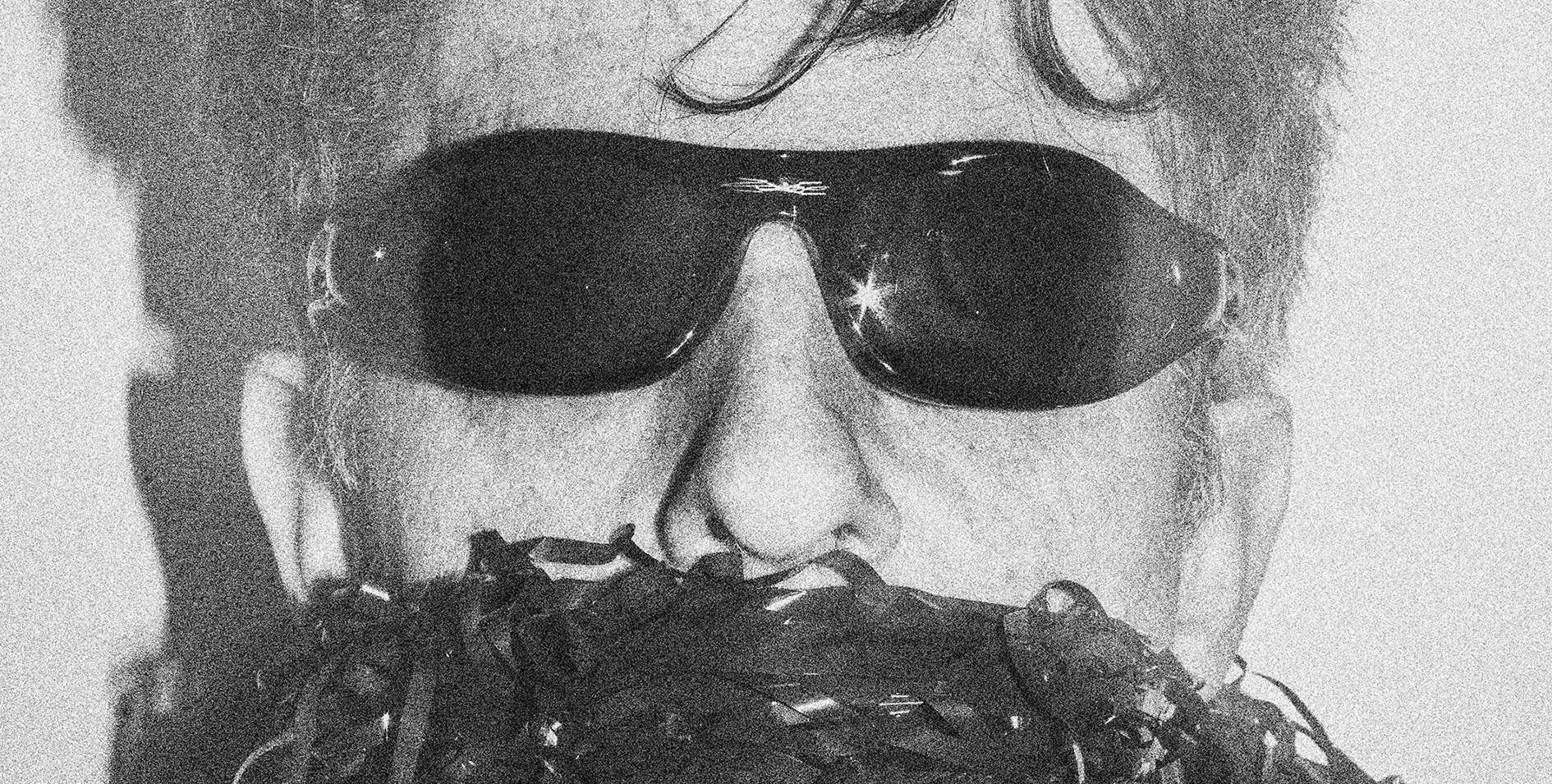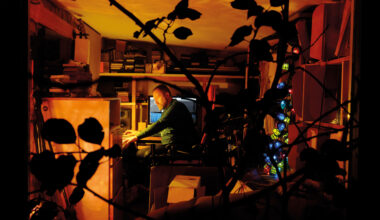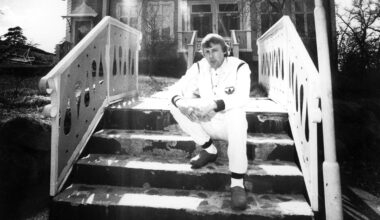Sound obsessive, tape loop guru, godfather of hauntology and – least likely of all – teen pin-up. For five decades, Drew Mulholland has been walking a very individual path
“I once dreamed that I was in a club, in a box overlooking the stage,” begins Drew Mulholland. “Glen Matlock, Steve Jones and Paul Cook came out and started playing the most amazing Sex Pistols riff ever. But then the singer appeared… and it was Sid James. Dressed as he was in ‘Carry On Camping’. And the group was called The Sid Pistols! While the riff was playing, he just walked up and down the front of the stage, leering and laughing at the girls in the front row, ‘hyak, hyak, hyak’.
“Some time later, I was playing my ‘Anarchy In The UK’ single at home. I put it on and walked away from it, but I’d forgotten to change the record player from 33 rpm to 45 rpm. So when Johnny Rotten started laughing – ‘hyak, hyak, hyak’ – it sounded exactly like Sid James! I thought, ‘Have I always known that? Did my brain recognise that and put it into my dream?’. It’s a weird connection.”
It’s a dark and filthy winter’s afternoon. Freezing rain is lashing against the windows of Drew’s book-lined Glasgow apartment, but we have steaming coffee and apple turnovers, and we’re cosily contemplating the interconnectedness of all things, so life is sweet. Drew Mulholland is splendid company, and he’s now spent over 50 years exploring those “weird connections” between sound, music, memory, the paranormal and pretty much everything else in between. His new book, ‘Elizabethan Tape Loops’, is a love letter to what he calls “the path” and to the teenage friend who began the journey with him, back in the early 1970s.
“I was walking down the road one day, when I saw Paul Cavanan in his garden,” remembers Drew. “I was absolutely convinced I knew him from somewhere, so I stopped and said hello, and we just started talking.
And we never stopped.
“Paul was a couple of years older than me and had friends at school who were a couple of years older than him. He came in one day and said, ‘You know Marek? He’s got a group called Lodestone and they’ve made a tape’. He put it on, and it was the sound of a ball bearing rolling down a drainpipe… and it just kept going. I said, ‘What’s on the other side?’, and Paul said, ‘No, look!’, and inside the cassette was a homemade tape loop. And it was just… [he visibly shivers] I can feel it even now. ‘This is brilliant – and anyone can do it. Which means I can do it’. Up until that point, people who made records lived in mansions. But this was an ‘in’ for people like us. We instantly started making tape loops ourselves.”
It was 1973. Drew and Paul lived in Mount Vernon, a “weird little island” of an east Glasgow suburb, their houses sandwiched between a railway breaker’s yard and a farmer’s field riddled with spent wartime ack-ack shells.
And their interests in the more esoteric aspects of the musical world expanded even further when Drew discovered the illicit thrills of shoplifting. In particular, the BBC Radiophonic Workshop’s 1976 album, ‘Out Of This World’. Where did he pilfer it from, I wonder? Glasgow Woolworths?
“No, it was more dangerous than that,” he smiles. “Do you know the Barras Market? It’s in the east end of Glasgow, and if a stallholder caught you shoplifting… well, he wouldn’t call the police. I’m not going to say any more. But I was 15, I had no money, and I thought, ‘Right, I’m having this’. It looked spacey, and it had ‘Doctor Who’ on the sleeve. And the tracks that jumped out at me were all credited to ‘DD’. Delia Derbyshire.
Sound effects albums were a huge thing for me, too – motorboats panning from left to right! They were brilliant.”
I was the same, I tell him. The idea of using sound as a medium to transport me from the everyday humdrum was incredibly alluring.
“That was it,” says Drew. “It was the sound world that interested me, then the electronic music. All these things coming from different directions that seemed to make a whole.
“Then Paul and I got very interested in the Baader-Meinhof group, and why it was happening. Paul said, ‘Could you make me the sound of a terrorist attack?’. So I got my BBC Sound Effects albums and made a recording, but I let the blank tape run for about 40 seconds first. So when Paul came round, I said, ‘I’ll get some tea’, and went into the kitchen… and my timing, for once, was spot on. I gave him his tea then went back for biscuits, counting down ‘7-6-5…’ in my head. Then it went off, and it was very loud. I heard a yelp, and Paul had spilled PG Tips all over his crotch.”
Punk happened. There was a photocopied fanzine – Mount Vernon’s Burning – and a short-lived band called The Targets (“I was thrown out of my own band in my own garage,” sighs Drew). But unlikely dreams of pop subversion were beginning to coalesce.
“Paul introduced me to a guy called Dennis, who had a bass and needed a guitarist. We met up and got on like a house on fire, we got a singer and a drummer, and called ourselves Pioneers West. We had the ridiculous idea of writing the most poppy 1980s music imaginable to get signed by a big label, then telling them we weren’t doing that anymore and recording all this weird stuff instead. We had a friend, Alex, who became our manager. He phoned up one day and said, ‘I’ve got you a piece in a magazine. It’s a double-page spread in Jackie’.”
What?! You were actually in Jackie, the magazine for teenage girls?
“Yep,” he confirms, wincing. “June 1985, with Madonna on the cover. The angle was that we didn’t yet have an image, so Jackie said they‘d come up and do pictures of us, before and after. They sent us shopping with two really nice young women, then to a photographic studio in the west end of Glasgow with these rotten Duran Duran clothes on. It was just horrendous. And I’ll never forget, when we were getting changed afterwards, our keyboard player put his arm around me and said, ‘Drew, think about it. When we get signed, every day will be like this’. I just said, ‘I’m leaving. This is absolutely shite, and there’s nothing about it that interests me’.”

He remains publicity-shy, with a sense of modesty that is, he suggests, almost part of the genetic make-up of east Glasgow. A recently released compilation, ‘Deltic Vespers’, showcases his 4-track recordings of the 1980s, and they’re a mile away from the pop dreams of Jackie magazine. Scary tape loops and drones are interspersed with ‘96 Tears’-style garage workouts. By 1996, he was recording as Mount Vernon Arts Lab, with cassettes initially sold through local record shops (“They were in see-through bags from Tesco”), attracting a burgeoning fanbase.
Both Teenage Fanclub’s Norman Blake and Pete “Sonic Boom” Kember featured on 1998’s debut album proper, ‘Gummy Twinkle’. Kember, Drew reveals gleefully, even put him in touch with Delia Derbyshire for a series of life-enriching phone conversations.
“He found her in the Northampton phone book,” he smiles. “After we got to know each other, Delia would tell me stuff about meeting Brian Jones and The Beatles. It was all new-fangled pop music to her, but she had enough about her to connect with people like that. It was a very enjoyable education. I was talking to someone who was there for all the stuff I’d grown up reading about.”
‘Warminster’, meanwhile, was a 1999 collaboration with Portishead guitarist Adrian Utley. A Radiophonic Workshop-inspired exploration of a spate of 1970s Wiltshire UFO sightings, it showcased Drew’s lifelong fascination with the otherworldly.
“I only remember one big argument with my dad,” he recalls. “He said you could time-travel to the past, but you couldn’t go into the future, and I disagreed with him. We watched a lot of sci-fi and horror films, and if something came up in the film, we’d run with it and have discussion after discussion. The books I had as a kid were all about the Bermuda Triangle and Charles Berlitz, and my dad was the same as me – we were interested in why people believed in it all.”
The fascination peaked on ‘The Séance At Hobs Lane’, a 2001 album exploring 18th century occultism, ‘Quatermass And The Pit’ and the psychogeographical resonance of abandoned underground stations. Blake and Utley contributed again, together with Coil’s John Balance, Barry 7 of Add N To (X) and Belle & Sebastian’s Isobel Campbell. It’s a stunning piece of work and, with hindsight, a distinct turning point on “the path”. But it was only five years later, during a lean musical patch, that the album began to gather its own momentum.
“My daughter was in a newsagent’s looking for a comic, and I picked up The Wire magazine,” explains Drew. “I hadn’t seen it for years, but I opened it at random, and there was Mount Vernon Arts Lab! They were interviewing Jim Jupp from Ghost Box, who said one of the main influences in founding the label had been ‘The Séance At Hobs Lane’. I emailed him and said, ‘Thanks – it’s nice to know that the album has a life of its own’. Because, as far as I was concerned, it was all over. But he mailed back and said, ‘Can we re-release it?’ – and that was the beginning of Part Two, really. The next phase.”
And so, quite accidentally, Drew Mulholland became the godfather of hauntology. Over the last decade, his interests have taken him from sweaty gig venues to academic halls. He’s worked in the psychology department of Glasgow Caledonian University, and has been the geography department’s official composer-in-residence. There has been an overwhelming flurry of new albums – including ‘Three Antennas In A Quarry’, a realisation of a lost 1960s score sent to Drew and Pete Kember by their revered Delia Derbyshire.
His love of the uncanny remains paramount, together with his adoration of vintage horror films, an obsession reaching its apex on 2019’s ‘The Wicker Tapes’.
“I went with my friend David to do ‘The Wicker Man’ tour,” he explains. “We visited all the film locations, and nothing had changed. We got to the pub door – two grown men – and I said, ‘I can’t go in!’. But the last place we went to was Burrow Head, and David called me over excitedly. There they were… the stumps of the Wicker Man’s legs. With broken wood from them just lying around on the clifftop. I said, ‘Back to the car, get as many carrier bags as you can!’.”
There is, I suggest, an alchemical quality to his tape experiments. Loops created for ‘The Wicker Tapes’ were spooled around one of the Burrow Head slivers, a fragment of the actual “wicker man” itself. For 2020’s ‘A Haunting Strip Of Marshland’, he ground lichen with a pestle and mortar and glued it to the master tapes.
Does his interest in the paranormal, I wonder, stretch to the recording process? Can these physical rituals somehow magically imbue his albums with an extra essence of the inspiration behind them?
“It depends,” he says. “You’ve got a tape loop going round a piece of wood from ‘The Wicker Man’. So on one level, it makes a physical impression on the tape. But then we head into fantastical thinking. Is there something about ‘The Wicker Man’ in this piece of wood that somehow goes into the sounds on the tape? And that’s a psychological area. There’s a classic psychology device; the lecturer comes out carrying a cardigan. He gives it to the students and asks what they think of it as they pass it around. And they say, ‘Nice design, a bit retro’. ‘Oh, you like it then?’ ‘Yeah!’ And then he says, ‘It used to belong to Adolf Hitler’.
“So instantly, it becomes something else. And obviously, it’s just the lecturer’s cardigan – it never belonged to Hitler at all. But it’s the same principle as the wood from ‘The Wicker Man’. ‘Here’s a piece of wood…’ ‘Right.’ ‘Here’s a piece of wood from the ‘The Wicker Man.’ ‘What?!’ And that’s the area I’ve gone into, without realising it.”
But are those properties something we impose, rather than something intrinsic about the object itself?
“Yes, they come from us.”
He talks excitedly of future projects. This year will see an album based on the portmanteau horror films of the 1970s and a collaboration with Generation X guitarist Derwood Andrews that also features the fretboard talents of Paul McGann – yes, that Paul McGann. “The path”, as he describes it, has been long, winding and fascinating. And the book feels like a tribute to the man who was there at the start. Drew’s teenage comrade Paul Canavan died in 1997, and ‘Elizabethan Tape Loops’ is clearly an extended “thank you” to his friend.
“Yeah, it is,” he smiles. “I thought I had to acknowledge that where I’ve ended up is all down to that man. And of course, in writing it, I’ve remembered things, places, smells. Phone calls on Saturday mornings. ‘Get down to this house – you’ve got to hear this record! What do you mean you’ve never heard of The Sensational Alex Harvey Band?’”
So Paul started it all?
“Yeah…”
Drew Mulholland pauses, and the Glaswegian modesty gene kicks in once again.
“Or it’s his fault.”
‘Elizabethan Tape Loops’ is published by Hidden Britain






